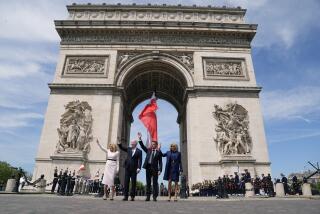Reagan, Mitterrand Agree to Fresh Start
TOKYO â President Reagan and French President Francois Mitterrand went to unusual lengths Tuesday to patch up their relationship, which has been especially strained since France refused to allow American F-111 warplanes to fly through its airspace on their way to last monthâs bombing raid on Libya.
âLet this be the first day of the rest of our lives,â Reagan told Mitterrand in a private meeting at the residence of U.S. Ambassador to Japan Mike Mansfield.
The well-worn aphorism brought laughter from the White House press corps when it was reported by an Administration official. But Reagan did not have a monopoly on cliches.
âWe will talk openly and candidly,â Mitterrand was quoted as saying. âThe future begins over the next few years.â
Reagan was obviously delighted to hear the exceptionally warm words from the reserved French president.
âOur friendship is our mainstay,â Mitterrand said at one point. âWe do not wish to settle into a crisis situation with the United States.â
Reagan responded to that with the familiar thought, âIn every happy marriage, there are disagreements, but the marriage continues.â
An Administration official, who spoke on the condition that he not be identified, gave an extensive account of Mitterrandâs remarks in the meeting with Reagan--something that is not usually done with a foreign leader.
The release of Mitterrandâs quotations was âcoordinatedâ with the French, a White House aide said, adding, âBoth sides have made an effort to patch things up.â
Reagan and Mitterrand have clashed personally and politically almost from the moment Mitterrand took office in 1981 as head of the new Socialist government.
But their relationship deteriorated sharply when France blocked U.S. pilots from using French airspace during the April 15 raid on Tripoli and Benghazi, a move that forced the pilots to detour around the Iberian Peninsula and added 1,200 miles to the already risky flight from air bases in England.
The U.S. official who briefed reporters said Mitterrand âturned gentlyâ to the overflight question during the meeting with Reagan and that the two men discussed it âin very diplomatic language.â
Both seemed eager to forget the clash. When a reporter asked Reagan during a photo session at the start of the meeting whether he was still irritated with the French for refusing the overflight rights, Reagan declined to answer and chided, âThatâs a very tactless question.â
Especially Tricky
The reconciliation effort was especially tricky because of the presence of French Premier Jacques Chirac, a conservative whose party defeated the Socialists in a parliamentary election earlier this year.
Chirac, Franceâs head of government, skipped the opening ceremonies of the summit Sunday but attended meetings in a role that was nearly equal to that of head of state Mitterrand, a situation regarded as particularly difficult for the proud Mitterrand.
The U.S. official said that Chirac âjoined in freelyâ in the discussion with Reagan but deferred to Mitterrand by letting him introduce the topics of conversation.
Chirac did interject that France was the only nation in which there were no public demonstrations against the United States after the raid on Libya.
âThe balance sheet, where public opinion is concerned, is a positive balance sheet,â Chirac said. âNow, this is behind us.â
Terrorism, Subsidies
Only two subjects were discussed in the 45-minute session: terrorism and agricultural subsidies.
In a press conference after the meeting, Mitterrand indicated that he has not had a change of heart on either subject despite the generous words he and Reagan exchanged.
He continued to question Reaganâs anti-protectionist sentiments, and he said he has no regrets about Franceâs decision to deny overflight to U.S. warplanes. It was âan exercise of our sovereignty,â he said.
But in his meeting with Reagan, he urged that they place their disagreement over the Libyan raid âin the context of 200 years of history.â And he told Reagan: âYou will find us in the front ranks of those who side with you on what we hold dear. This includes terrorism.â
Mitterrand was among the last holdouts against naming Libya as a terrorist state in a summit declaration deploring terrorism. He said he changed his mind after being persuaded--reportedly by British Prime Minister Margaret Thatcher--that the statement was directed at the regime of Col. Moammar Kadafi and not the Libyan people.
âWe should isolate the leader, but not the people,â he told Reagan.
Avoiding a Mine Field
In his press conference, Mitterrand observed that none of the leaders proposed mentioning in the statement other countries widely believed to support terrorism, such as Syria and Iran. The United States âdid not want to walk into that mine field,â he observed.
The history of French-American relations is mostly one of amity. The tone was established before the United States was founded, when the French monarchy sided with revolutionary Americans against Englandâs George III. In this century, U.S. help for France, occupied by a foreign power in two world wars, continued the pattern.
After World War II, however, U.S.-French ties were strongly affected by President Charles de Gaulleâs determination to restore his country to its former leading role on the world stage. Under De Gaulle, France worked to establish an independent nuclear force, refused to sign nuclear test-ban and non-proliferation treaties and withdrew its military forces from the umbrella of the North Atlantic Treaty Organization. De Gaulle also denounced Washington for what he called its âhegemonisticâ tendencies in world political and economic affairs.
Although succeeding French leaders, such as Valery Giscard dâEstaing, sought to bring the two countries closer together, none have turned back the clock to the days immediately following the liberation of Paris in World War II.
The most recent expression of anti-French sentiment in the United States followed Mitterrandâs denial of airspace to the U.S. fighter-bombers. In a spontaneous outburst, residents of many American communities turned out to chant anti-French slogans, dump French wine and burn French photos and posters--and even French fries.
More to Read
Sign up for Essential California
The most important California stories and recommendations in your inbox every morning.
You may occasionally receive promotional content from the Los Angeles Times.











